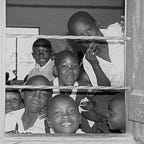Building back better through Community-Led Learning
Many schools remain closed around the world due to COVID-19, but learning must continue. In Uganda, schools closed in March 2020, with an estimated 13 million children remaining at home since then. The Ministry of Education and Sports (MoES) in Uganda, with support from the Strengthening Education Systems for Improved Learning (SESIL) programme, has provided distance-learning materials, including radio lessons, but opportunities to learn are limited for the most marginalised children.
COVID-19 has both highlighted and exacerbated education inequalities. It also presents an urgent opportunity for UK aid-funded SESIL to support MoES to establish an effective out-of-school approach to help the most marginalised children to continue to learn.
On the of 1st February 2021, SESIL launched the Community-Led Learning (CLL) initiative. Initially targeting 12,000 children in 77 parishes, across 15 local governments in West Nile and Eastern Uganda, the programme brings small groups of early primary school learners together for literacy and numeracy lessons run by local volunteers.
Alex Kakooza, the Permanent Secretary of the MoES, encourages parents and guardians to support Community-Led Learning in their communities, “This is a very good programme. It is a community effort. The community needs to sensitise parents to ensure that children come to school [for Community-Led Learning classes] in time.”
Alesi Alice from Vura Village and member of Tilevu Parish Community-Led Learning Implementation Committee stated that “Community-Led Learning is overdue. Children seemed to have forgotten all that they had learnt before closure of schools due to COVID-19. Parents had also failed to enforce radio lessons. Community-Led Learning has rightly bridged the gap between school and home”.
However, Community-Led Learning is not just a short-term fix. It has been designed to be a longer-term opportunity for communities to help reduce the learning gaps for children who are in school, once classes resume in June.
Learning outcomes were on the decline in Uganda, even prior to school closures. 2019 assessment data from Uwezo (an independent organisation specialising in national household surveys of early grade learning) indicated that, for example, only one in three learners in classes Primary 3 to Primary 7 can read and comprehend a basic Primary 2 level story. The Community Led Learning baseline assessment also found that 90% of children registered in the initiative are non-readers. Community-Led Learning will focus on these pre-existing gaps, which have been exacerbated by COVID-19, targeting the learners with the lowest literacy and numeracy indicators.
To ensure the initiative reaches the children who need it most, Community-Led Learning will also prioritise the learning of girls, in line with the UK government’s commitment to ensure all girls get 12 years of quality education, as well as getting more girls reading by the age of ten. Over half of the registered learners in Community Led Learning are girls.
Girls have been most affected by the outbreak of COVID-19 due to the multiple and intersecting obstacles that they face. Many girls are unlikely to return to school due to challenges such as increased domestic work, early and unintended pregnancy and forced marriage, which often increase during emergencies when there is no safe space for learning.
Primary 6 learner, Letaru Patricia, explained, “The biggest challenge I have had is being bored at home, the household chores are choking, with limited time to rest. I also met a boy who has been asking me to be his wife. I am only 12 years old and not ready to get married. Losing my best friend to early marriage makes me feel bad but I am excited to go back to school and I feel confident that my health and safety is guaranteed.”
Community-Led Learning classes are run by volunteers, more than half of whom are women. The volunteers use pre-prepared and highly structured lesson materials, developed by the SESIL programme and the National Curriculum Development Centre. Volunteers, known as Community Learning Facilitators, are residents within the parish and have been vetted through the Local Council system, with the support of the Parish Chief.
Julius Mufuma, the Community Learning Facilitator from Bumeamba Parish in Bududa District, said, “I saw many learners, the young ones, who were wasting time. They were playing and not revising their books. When I saw the programme come, I was so happy with it. To realise that maybe I can be an agent of change. We are now reminding the learners of what they were taught before the lockdown.”
Community-Led Learning is an opportunity for committed communities to take the lead in increasing their children’s chances to learn. Communities are tasked with identifying and maintaining suitable and safe venues for the lessons and ensuring COVID-19 hygiene and safety precautions are adhered to. Each class has a maximum of 20 learners to enable adequate physical distancing.
Chekwurui Eunice, the Community-Led Learning Committee member and Chief for Kapkoch Parish, expressed her enthusiasm, “The community is very excited about the programme. The Community-Led Learning Committee has done a lot of mobilisation to meet the necessary conditions to enable learning for the selected children. The parents have already provided pens, pencils and exercise books to the learners and parents are sending their children to report for the classes. The community is looking forward to see how the Community-Led Learning programme can expand.”
It is hoped that strong local ownership will improve the sustainability of Community-Led Learning and propel it to nationwide scale.
The challenge ahead, for parents, teachers, school management and decision-makers at local and national levels, is significant. Failing to rise to this challenge will have a life-long impact on children and the wider community. Improving the resilience of the education system through the development of quality and inclusive education for the most marginalised children is SESIL’s priority. Community-Led Learning will seek to achieve this during the pandemic and going forward into a post-COVID-19 world.
